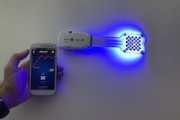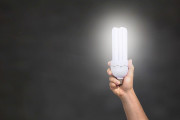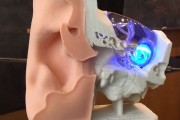 2019-08-01
2019-08-01
Scientists have demonstrated blue light’s anti-microbial and anti-inflammatory effects and they turned it into a flexible bandage to heal wounds. MEDILIGHT, a European research project which aims to develop smart and wearable medical devices, have presented a prototype of the LED embedded light solution for treating chronic wounds. Within the framework of the European project MEDILIGHT, seven partners including research teams from Germany France, Switzerland, Cyprus, the UK and Czech, were coordinated by the Technical University of Berlin (TUB)....
Continue reading →
 2019-05-31
2019-05-31
LED lighting could help to improve brain activity including memory and cognitive function, according to the research by a professor of bioengineering at The University of Texas at Arlington.
Hanli Liu and Jacek Dmochowski, the assistant professor of bioengineering at City University of New York, are working on using a light-based technology to increase the energy available to brain cells and improve astronaut performance with an $800,000 NASA grant.
Liu researches how to use lasers to deliver near-infrared light to the human brain to detect traumatic brain injurie...
Continue reading →
 2019-03-06
2019-03-06
Researchers at the Leiden University Medical Center (LUMC) published a new finding of LED medical application for correcting heart rhythm disorder.
The research team used a bioelectronics defibrillator implanted with LED to reset irregular heartbeat. They developed a system which detects fast arrhythmias in the atrium of a rat’s heart and sends a signal to an LED device placed near the heart. “The flash of light from this LED then causes the heart to generate an electric current itself to halt the arrhythmia. This is made possible by using gene therapy...
Continue reading →
 2018-07-23
2018-07-23
Cochlear implant is a device using electrodes to stimulate the auditory nerve to help hearing-impaired people to “hear.” But it cannot deliver complex sound as the electrode current does not move from the electrode to an auditory neuron directly. Researchers have been exploring the possibilities to replace electricity with light in cochlear implants via optogenetics technology.
Continue reading →
 2019-08-01
2019-08-01
 2019-05-31
2019-05-31
 2019-03-06
2019-03-06
 2018-07-23
2018-07-23